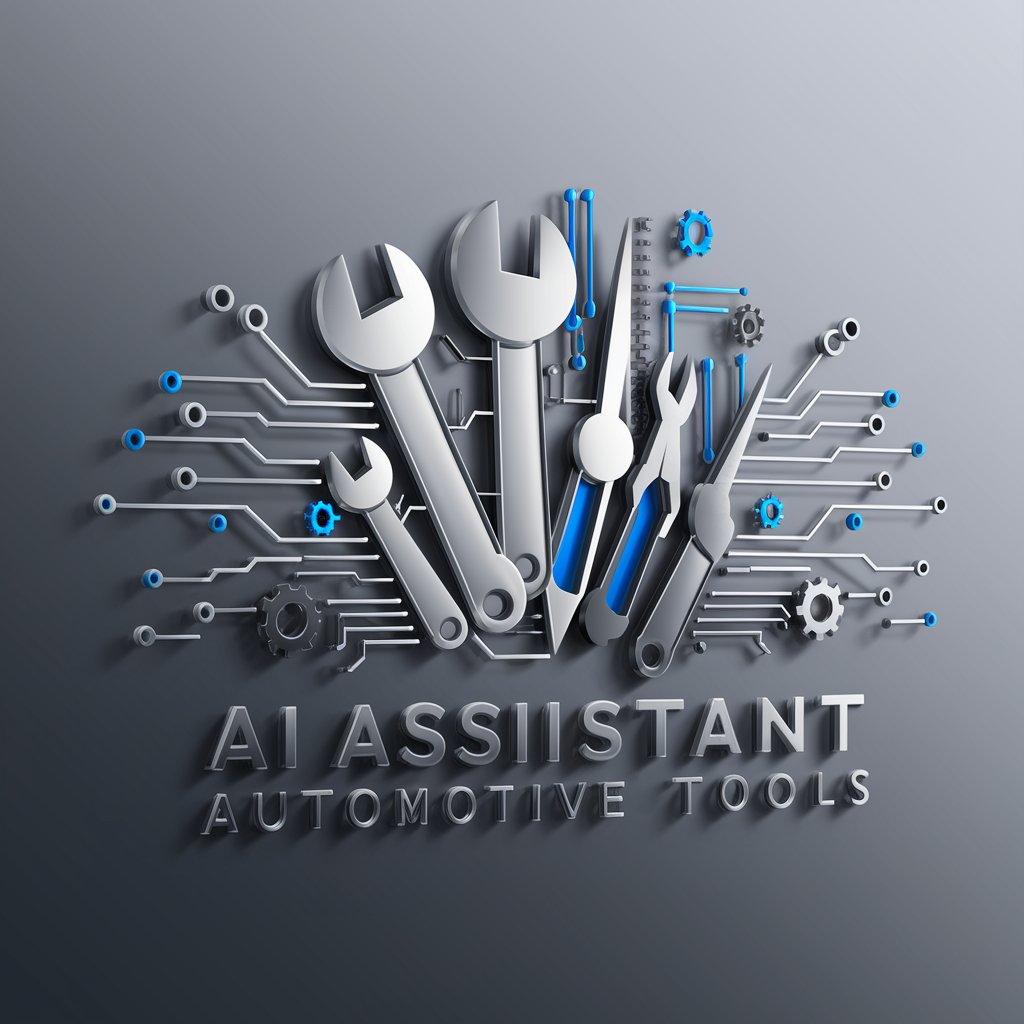Automotive Tools - Automotive Tool Guidance

Welcome! Let's explore the world of automotive tools.
Empowering Auto Repairs with AI
Explain the function of a torque wrench in automotive repair.
How do you properly use an OBD-II scanner?
What are the essential tools needed for a brake pad replacement?
Describe the steps for safely using a hydraulic jack.
Get Embed Code
Overview of Automotive Tools
Automotive tools encompass a wide range of equipment and instruments designed specifically for the maintenance, repair, and enhancement of vehicles. This category includes hand tools like wrenches, pliers, and screwdrivers, diagnostic tools such as OBD (On-Board Diagnostics) scanners, and power tools like impact wrenches and drills. The primary design purpose of these tools is to facilitate the complex tasks involved in automotive work, making them more efficient and accessible for professionals and enthusiasts alike. For example, a torque wrench is designed to apply a specific amount of torque to a nut or bolt, crucial for ensuring vehicle safety and performance. Similarly, a diagnostic tool can quickly identify engine errors or electronic system faults, guiding technicians in their repair strategies. These tools are fundamental in scenarios ranging from routine vehicle maintenance, such as oil changes and tire rotations, to more complex repairs involving engine overhauls or electrical system troubleshooting. Powered by ChatGPT-4o。

Core Functions of Automotive Tools
Diagnosis and Troubleshooting
Example
Using an OBD-II scanner to read error codes from a vehicle's computer system.
Scenario
When a vehicle's check engine light turns on, an OBD-II scanner can be used to identify the specific error code, helping technicians pinpoint and address the underlying issue, whether it's a faulty oxygen sensor or a misfiring engine.
Maintenance and Repair
Example
Utilizing a pneumatic impact wrench to remove lug nuts during a tire change.
Scenario
In a tire service shop, technicians use pneumatic impact wrenches for their high torque output, enabling quick and efficient removal of lug nuts when replacing or rotating tires, significantly reducing the manual effort and time required.
Performance Enhancement
Example
Adjusting a vehicle’s suspension setup with specialized alignment tools.
Scenario
Automotive enthusiasts seeking to optimize their vehicle's handling for track days may use camber/caster gauges and wheel alignment tools to adjust the suspension geometry, enhancing grip and stability at high speeds.
Target Users of Automotive Tools
Professional Mechanics
Professionals working in auto repair shops or maintenance facilities, who require a wide array of tools for complex diagnostic, maintenance, and repair tasks. Their expertise allows them to leverage specialized tools for efficient and effective service.
Automotive Enthusiasts
DIYers and car hobbyists who engage in vehicle maintenance and modification projects in their own garages. They benefit from using automotive tools to perform tasks accurately and safely, enhancing their vehicle's performance and longevity.
Vocational Educators
Instructors and trainers in automotive technology programs who use these tools as teaching aids to provide practical, hands-on experience to students, preparing them for careers in the automotive service industry.

How to Utilize Automotive Tools Effectively
Initiate Your Journey
Start by exploring automotive tools at a trusted platform, such as initiating a trial at a specialized site, which requires no signup or premium membership.
Identify Your Needs
Determine the specific automotive task you're tackling, whether it's repair, maintenance, or customization, to select the appropriate tools.
Gather Essential Tools
Equip yourself with basic automotive tools such as wrenches, screwdrivers, and a diagnostic scanner, ensuring you have the right tool for each task.
Follow Safety Protocols
Prioritize safety by wearing protective gear and adhering to guidelines, particularly when dealing with electrical components or heavy machinery.
Consult Resources
Utilize manuals, online forums, and tutorials to understand the nuances of each tool's operation and to troubleshoot any issues encountered.
Try other advanced and practical GPTs
'Sports Oracle
Elevate your game with AI-powered sports predictions.

Woz The Wiz
Empowering coding skills with AI-powered assistance

Peace Mentor Course: Emerging Technologies
Empowering Peace with Technology

Wonky Techno Master
Unveiling the Depths of Wonky Techno

Healthcare
Empowering health decisions with AI.

Hospital
Empowering Your Health Journey with AI

SMSLOCAL TITLE
Elevate Your SMS Campaigns with AI-Powered Titles

Dwarf Fortress Dwarf
Master Dwarf Fortress with AI

Tarot Cat
Empower your journey with AI-powered Tarot wisdom.

ERISA Compliance Navigator
AI-driven ERISA Compliance Assistance

PromptEnhacer
Elevate Your AI Interaction with Precision

HR Advisor: Ethical AI
Empowering HR with Ethical AI Insights

In-Depth Q&A on Automotive Tools
What basic automotive tools should every garage have?
Every garage should be equipped with a set of wrenches, socket sets, screwdrivers, pliers, a torque wrench, an impact wrench, and a reliable diagnostic scanner for troubleshooting.
How do I choose the right automotive diagnostic scanner?
Select a scanner based on compatibility with your vehicle's make and model, the scanner's features such as code reading and real-time data, and its user-friendliness.
Can automotive tools be used for DIY projects?
Absolutely, automotive tools are ideal for DIY enthusiasts. With the right tools and knowledge, you can perform a wide range of maintenance and repair tasks at home.
What safety measures should I take when using automotive tools?
Always wear protective gear like gloves and goggles, ensure your work area is well-lit and ventilated, and follow the tool's operating instructions precisely to avoid accidents.
How do I maintain my automotive tools?
Keep tools clean and dry, store them properly to prevent damage, regularly check for wear and tear, and lubricate moving parts to ensure longevity and reliability.
